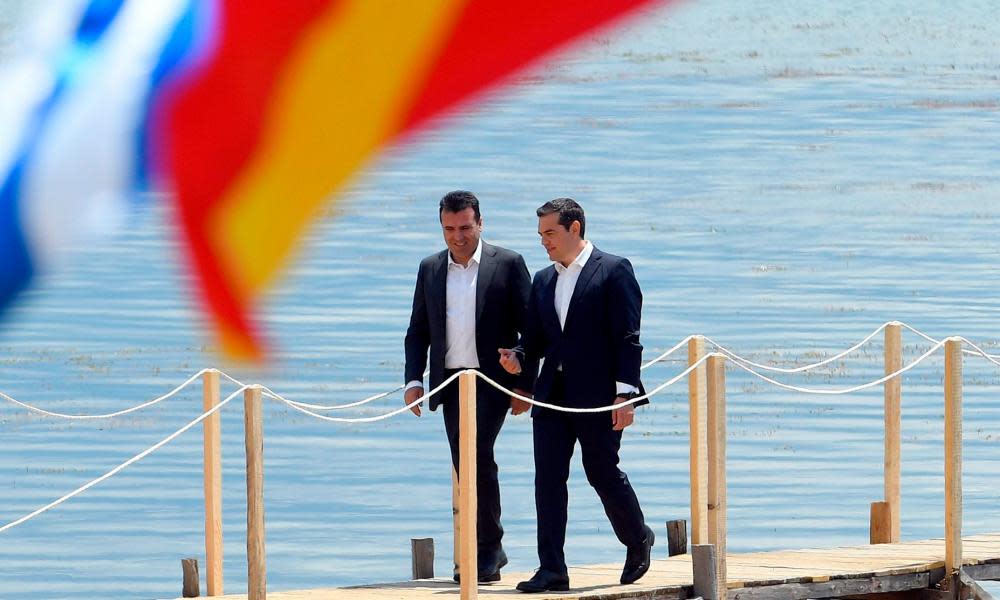Historic deal on shared Macedonian identity must be honoured

The historic agreement of 17 June signed between Greece and the Former Yugoslav Republic of Macedonia (Fyrom) ends a dispute that had been festering for the last 25 years (Report, 19 June). It defines the political, historical and cultural boundaries between classical Greek Macedonia and – as of now – North Macedonia, by making it clear Macedonian identity can be shared between people who endow it with different meanings. It respects the dignity and the right to self-determination of the two peoples and confirms the desire of both countries for peaceful coexistence.
Each side has had to address the concerns of the other. For Greece, the geographical designation in the compound new name (North Macedonia), its application domestically and internationally, and the requirement that the constitution of Fyrom be amended accordingly. For North Macedonia, acceptance of the existence of a Macedonian language as part of the Slavic family of languages (a fact long recognised by the UN and Greece), the designation of the nationality as Macedonian/citizens of North Macedonia and, crucially, the promise of starting accession negotiations to Nato and the EU.
When completed, this legally binding international agreement will have resolved an issue of contested political identity, so common in multicultural societies, and will offer a model for future resolution of other protracted conflicts.
But the agreement still faces big hurdles in both countries, where hardliners and extremists are mobilising against it. North Macedonia’s government, in particular, desperately needs for all parties to fulfil their promise if it is to win the ratifying referendum in the autumn.
In these critical times, when Europe faces the rise of extreme rightwing nationalism and racism, and dangerous revisionisms are resurfacing in the Balkans and Europe dividing people into “traitors” and “patriots”, it is more important than ever to support those who take risks for reconciliation. We support this fair agreement and call on all parties to fulfil their end of the bargain.
Costas Douzinas Birkbeck, University of London
Judith Butler University of California, Berkeley
Jean Luc Nancy Philosopher, Strasbourg
Barbara Spinelli Member of the European parliament
Wendy Brown University of California, Berkeley
Joanna Bourke Birkbeck, University of London
Luciana Castellina Rome
Frieder Otto Wolf Freie Universität Berlin
Catherine Malabou Kingston University
Claude Calame EHESS, Paris
Bo Stråth University of Helsinki
Susan Buck-Morss City University of New York
Sandro Mezzadra University of Bologna
Patrice Maniglier Université Paris Nanterre
Elsa Stamatopoulou Columbia University
Niccolo Milanese European Alternatives
Giacomo Marramao Roma Tre University in Rome
Edouard Delruelle Université de Liège
Peter Schöttler Freie Universität Berlin
Ulrike Guérot Danube University Krems, Austria
Ahmet Insel Université Paris 1 Panthéon-Sorbonne
Philippe Büttgen Université Paris 1 Panthéon-Sorbonne
Yves Sintomer Université Paris 8 Vincennes Saint-Denis, CSU-Cresppa
Emily Apter New York University
Oscar Guardiola-Rivera Birkbeck, University of London
Albena Azmanova University of Kent
Louis Wolcher University of Washington
Jean-Numa Ducange University of Rouen
Michal Kozlowski University of Warsaw
José Luis Villacañas Universidad Complutense de Madrid
Gilles Manceron Historian, Paris
Diogo Sardinia Paris University
Bertrand Ogilvie Université Paris 8 Vincennes Saint-Denis
Yves Sintomer Université Paris 8 Vincennes Saint-Denis
Franck Fischbach Univesite de Strasbourg
Teresa Pullano University of Basel
Matthieu de Nanteuil University of Louvain
Pietro de Matteis University of Cambridge
Guillaume Sibertin-Blanc Université Paris 8 Saint-Denis
Stefan Jonsson Linköping University
Manuela Bojadzijev University of Berlin
Rada Ivekovic College International de Philosophie, Paris
• Would you like to submit a photograph to be printed in the Guardian’s letters spread? If so, you can do so here
• Join the debate – email guardian.letters@theguardian.com
• Read more Guardian letters – click here to visit gu.com/letters

 Yahoo News
Yahoo News 
